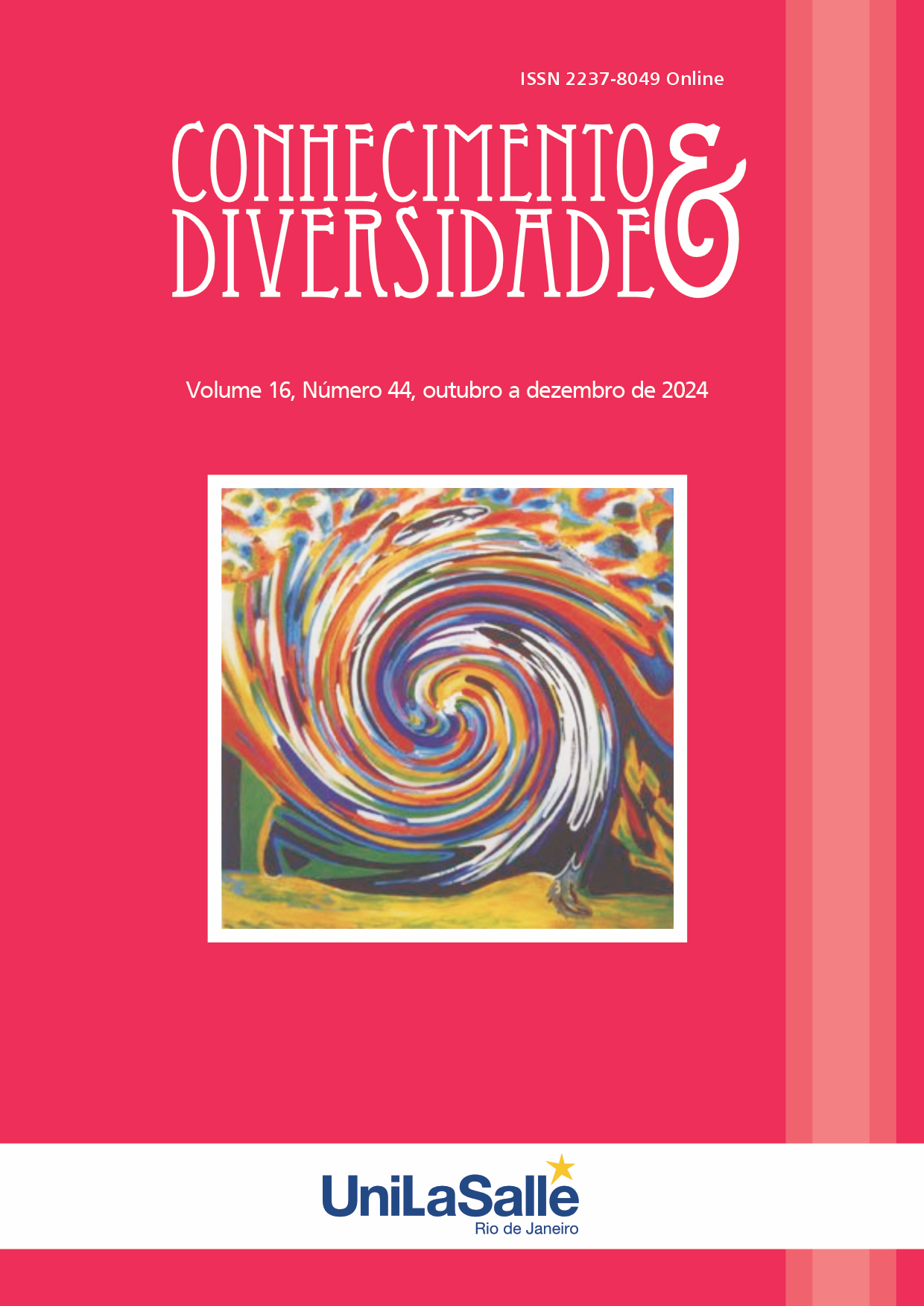A REFORMA EDUCACIONAL ABRANGENTE DO VIETNÃ
REFLEXÕES APÓS UMA DÉCADA DE IMPLEMENTAÇÃO (2013–2024)
DOI:
https://doi.org/10.18316/rcd.v16i44.12285Palavras-chave:
Reforma Educacional, Qualidade dos Professores, Industrialização, Integração Internacional, VietnameResumo
Este estudo avalia o progresso da reforma educacional do Vietnã, iniciada sob a Resolução nº 29-NQ/TW em 2013, que visava alinhar o sistema educacional do país com objetivos socioeconômicos como industrialização, modernização e integração global. Usando uma abordagem de métodos mistos que combina análises quantitativas e qualitativas, a pesquisa examina conquistas, desafios e limitações em áreas-chave como educação centrada no aluno, transformação digital, desenvolvimento de professores e internacionalização. Progresso significativo foi observado, incluindo a universalização da educação pré-escolar, melhorias nas qualificações de professores e a integração de ferramentas digitais, posicionando o Vietnã como um líder regional em educação. No entanto, os desafios permanecem, incluindo preparação insuficiente de recursos financeiros e humanos, implementação de políticas inconsistentes e a falta de uma filosofia educacional coesa. Desigualdades persistentes, metodologias de ensino desatualizadas e alinhamento limitado com as demandas do mercado de trabalho restringem ainda mais os esforços de reforma. As descobertas enfatizam a importância de investimentos direcionados em treinamento de professores, infraestrutura e governança, além de promover parcerias internacionais mais fortes. Este estudo destaca o potencial do Vietnã para estabelecer um sistema educacional globalmente competitivo e fornece recomendações acionáveis para abordar barreiras sistêmicas. Os resultados contribuem para discussões globais sobre reforma educacional em nações em desenvolvimento, oferecendo lições para transformação sustentável e equitativa.
Referências
Anh, N. N. (2015). Pedagogical Approaches in Viet Nam. In E. H.-F. Law & U. Miura (Eds.), Transforming Teaching and Learning in Asia and the Pacific: Case Studies from Seven Countries (pp. 124-141). UNESCO Office Bangkok. https://unesdoc.unesco.org/ark:/48223/pf0000232909
Beresford, M. (2008). Doi Moi in review: The challenges of building market socialism in Vietnam. Journal of Contemporary Asia, 38(2), 221-243. https://doi.org/10.1080/00472330701822314
Communist Party of Vietnam. (1996). Document of the Eighth National Party Congress. National Political Publishing House.
Communist Party of Vietnam. (2011). Document of the 11th National Party Congress. National Political Publishing House.
Communist Party of Vietnam. (2021). Document of the 13th National Party Congress. Hanoi: National Political Publishing House
Dang Hieu. (2018, Mar 15th). World Bank highly evaluates Vietnam’s education system. Communist Party of Vietnam Newspaper. Retrieved Dec 12th, 2024 from https://dangcongsan.vn/y-te/ngan-hang-the-gioi-danh-gia-cao-ve-he-thong-giao-duc-cua-viet-nam-476538.html
Dawe, D. (2002). The changing structure of the world rice market, 1950–2000. Food Policy, 27(4), 355-370. https://doi.org/10.1016/S0306-9192(02)00038-6
Duong, X. T. (2024, Feb 20th). The picture of education budget through numbers. Vietnam Education Newspaper. Retrieved Dec 16th, 2024 from https://giaoduc.net.vn/buc-tranh-ngan-sach-giao-duc-qua-nhung-con-so-2-post240824.gd
Fforde, A., & Paine, S. H. (2021). The limits of national liberation: Problems of economic management in the Democratic Republic of Vietnam, with a statistical appendix. Routledge. https://doi.org/10.4324/9781003243717
Ha, B. (2014, May 22). Enterprises score students: Theory and practice are both weak. Youth Newspaper. Retrieved Dec 16th, 2024 from https://tuoitre.vn/doanh-nghiep-cham-diem-sinh-vien-ly-thuyet-thuc-hanh-deu-yeu-608573.htm
Ho, L., & Dimmock, C. (2023). Changing teachers’ beliefs and practices towards learner-centred education: experiences and lessons from Vietnam’s education system reforms. PRACTICE, 5(3), 200-219. https://doi.org/10.1080/25783858.2023.2177191
Huong Giang. (2023, Aug 14th). National Assembly Chair: Seriously implement the compilation of a state textbook set. Inspectorate Newspaper. Retrieved Dec 12th, 2024 from https://thanhtra.com.vn/doi-noi-52FA82FBF/chu-tich-quoc-hoi-nghiem-tuc-thuc-hien-bien-soan-mot-bo-sach-giao-khoa-cua-nha-nuoc-7ED473DD.html
Huong, P. L., & Fry, G. W. (2004). Education and economic, political, and social change in Vietnam. Educational Research for Policy and Practice, 3, 199-222. https://doi.org/10.1007/s10671-005-0678-0
Le, H. N. T. (2024). Another Kind of Vietnamization: Language Policies in Higher Education in the Two Vietnams. In L. C. Kelley & G. Sasges (Eds.), Vietnam Over the Long Twentieth Century: Becoming Modern, Going Global (pp. 127-143). Springer. https://doi.org/10.1007/978-981-97-3611-9_7
National Assembly of Vietnam. (2019, Jun 14th). Education Law. Retrieved Dec 12th, 2024 from https://thuvienphapluat.vn/van-ban/Giao-duc/Luat-giao-duc-2019-367665.aspx
Nguyen, P. T., & Nguyen, Q. T. (2024). The philosophy of human emancipation in Ho Chi Minh’s ideas and its contemporary relevance in Vietnam. Kalagatos, 21(1), eK24009. https://revistas.uece.br/index.php/kalagatos/article/view/12513
Nguyen, T. A. (2024). The Internationalization of Higher Education in Vietnam: Impacts of Study Abroad Programs. In N. Kayashima, M. Sugimura, K. Kuroda, & Y. Kitamura (Eds.), Impacts of Study Abroad on Higher Education Development: Examining the Experiences of Faculty at Leading Universities in Southeast Asia (pp. 183-207). Springer. https://doi.org/10.1007/978-981-97-0775-1_10
Nguyen, T. N. T., & Nguyen, T. Q. (2021). Current education of revolutionary ideals for university students in the context of international integration in Vietnam. Nuances-Estudos Sobre Educacao, 32, e021007. https://doi.org/10.32930/NUANCES.V32I00.9120
Nguyen, T. Q., Phung, T. A., & Le, Q. C. (2021). The current education on professional ethics for Vietnamese students. Revista on line de Política e Gestão Educacional, 25(3), 2655–2669. https://doi.org/10.22633/rpge.v25i3.15869
Pham-Duc, B., Tran, T., Trinh, T.-P.-T., Nguyen, T.-T., Nguyen, N.-T., & Le, H.-T.-T. (2022). A spike in the scientific output on social sciences in Vietnam for recent three years: Evidence from bibliometric analysis in Scopus database (2000–2019). Journal of Information Science, 48(5), 623-639. https://doi.org/10.1177/0165551520977447
Pham, C., & Van, H. (2024, Nov 18th). Educational reform requires great efforts and strong breakthroughs. Communist Party of Vietnam Newspaper. Retrieved Dec 12th,2024 from https://dangcongsan.vn/giao-duc/doi-moi-giao-duc-va-dao-tao-doi-hoi-nhung-no-luc-lon-lao-va-su-but-pha-manh-me-683525.html#:~:text=Gi%C3%A1o%20d%E1%BB%A5c%20ph%E1%BB%95%20th%C3%B4ng%20c%E1%BB%A7a,nh%E1%BA%A5t%20tr%C3%AAn%20to%C3%A0n%20th%E1%BA%BF%20gi%E1%BB%9Bi
Phan, A. (2020, Nov 26th). Three Vietnam candidates debut in Asian university ranking. VnExpress. Retrieved Dec 16th, 2024 from https://e.vnexpress.net/news/news/three-vietnam-candidates-debut-in-asian-university-ranking-4197633.html
Quang, N. V., Thanh, N. H., Anh, N. N., Duat, T. N., & Anh, N. D. (2024). Friedrich Engels’s view on theoretical thinking: innovative application by the Communist Party of Vietnam in the reform process. Humanities and Social Sciences Communications, 11(1), 1497. https://doi.org/10.1057/s41599-024-03700-3
Thanh Hang. (2021, Jun 18th). More than 97% of Vietnamese people are literate. VnExpress. Retrieved Dec 12th, 2024 from https://vnexpress.net/hon-97-nguoi-viet-biet-chu-4296185.html#:~:text=T%E1%BB%B7%20l%E1%BB%87%20ng%C6%B0%E1%BB%9Di%20bi%E1%BA%BFt%20ch%E1%BB%AF,2020%2C%20s%C3%A1ng%2018%2F6
Vietnam Government Newspaper. (2024, Jul 16th). Decision on high school graduation exam plan from 2025. Vietnam Government Newspaper. Retrieved Dec 16th, 2024 from https://xaydungchinhsach.chinhphu.vn/toan-van-quyet-dinh-4068-qd-ttg-phuong-an-thi-tot-nghiep-thpt-tu-2025-11923112916510334.htm
Downloads
Publicado
Edição
Seção
Licença
Copyright (c) 2024 Tuyet Thi Minh Tran

Este trabalho está licenciado sob uma licença Creative Commons Attribution 4.0 International License.
Conforme recomendado pelo o Public Knowledge Project, a RCD adota para seus artigos uma licença CREATIVE COMMONS: Atribuição CC BY 4.0.
Esta licença permite que outros distribuam, remixem, adaptem e construam sobre o seu trabalho, mesmo comercialmente, desde que lhe dêem crédito pela criação original.
Esta é a licença mais adequada oferecida.
Recomendado para a máxima divulgação e uso de materiais licenciados.



